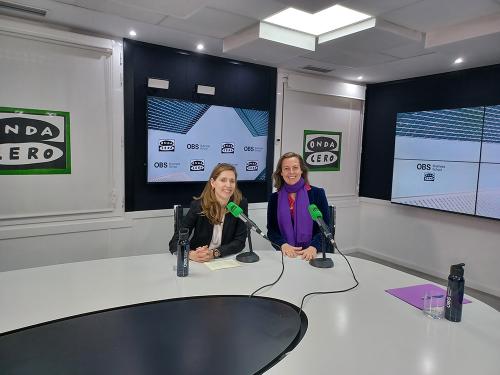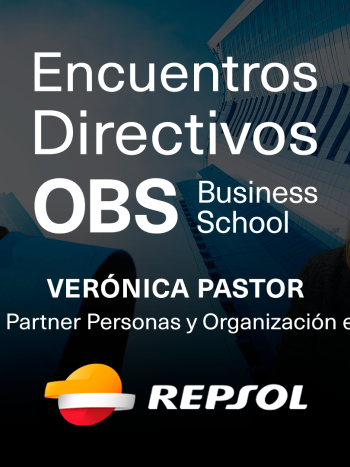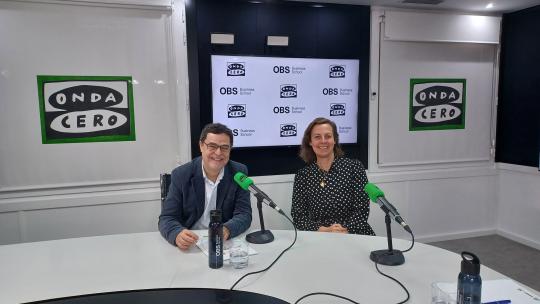
Executive Meeting with Verónica Pastor
Resistance to change is no longer in vogue
OBS Business School has held its III Executive Meeting of 2024 with the participation of Verónica Pastor, Business Partner of People and Organisation at Repsol and professor at the school's Tech MBA. Together with Dr. Casilda Güell, Dean of OBS, Pastor spoke about the fundamental role of energy in responding to the new realities, and how human resources work to incorporate the perfect profiles for this into companies.
The energy sector, like so many others, is changing to adapt to emerging sustainability challenges and become part of the solution, not the problem. Verónica Pastor says the sector is at the epicentre of change because it is at the start of all industrial production. "Today it can no longer be considered a "dirty" sector, because it is working in such interesting areas as low-carbon generation, circular economy, sustainable leisure sponsorship, renewable fuels, hydrogen, energy efficiency, electric mobility, photovoltaics and others," she says. This requires staffing that was not necessary before. "This change is forcing our human resources area to move fast in order to develop the skills of the company's staff, but also to recruit other profiles that are needed, and for this we have had to review our value proposition," she concluded.
Adapting to a paradigm shift
Today, human resources areas in the energy sector do not have it easy, because they need more complex profiles than a few years ago: people who not only know the business, the market, the sector and the competition, but who also have leadership skills and the so-called soft skills, which will help them to overcome the challenges they face. According to Pastor, candidates must understand that projects in the sector sometimes start from a blank sheet of paper, but others arise from knowing how to connect some areas with other existing ones. And she assures that it is very difficult for them to find profiles that fit completely.
In spite of this, Verónica Pastor considers that we are living a very interesting multigenerational moment, as ten years of difference between some employees and others is today a huge gap. "Today, each person is at a different point in their life and has different needs, which forces us to be very flexible," she says, and assures us that the employee is, after all, the company's first customer.
Asked about the role of women in the sector, Pastor said that 25 years ago they were not present at all and, although today they make up 22% of the workforce in the fossil fuels area and 32% in renewables, Repsol's goal is to reach 40% of hires and 35% in leadership positions. However, she says the shortage of girls in STEM careers is definitely a problem. For this reason, the company is developing mentoring programmes for girls to introduce them to the possibilities of a sector that is vital for facing the challenges of the future.
The role of HR in the business strategy
Verónica Pastor defends the need for the HR area to be fully involved in the company's planning and strategy. That is why, at Repsol, she forms part of the management committee. It is these professionals who are responsible for promoting change and the desire to do things differently. In addition, he states emphatically that resistance to change is no longer fashionable, but that we are all aware of it. Repsol works in two areas: through internal mobility and explaining to employees why and what the changes are for, and having specific areas that support these transformations. AI is undoubtedly being a very important tool for Repsol's HR because it helps when selecting candidates, especially by eliminating biases. The company also has Alex, a robot that has been trained for employee services, which is already providing important information.
As for the energy consumer, Verónica Pastor distinguishes between those who are guided by the sector as to where to go, and those who want to be protagonists in the transition. For these, Repsol has created solutions such as Waylet, which allows, among other things, the carbon footprint of each of the refuelling operations carried out by the customer to be compensated.





